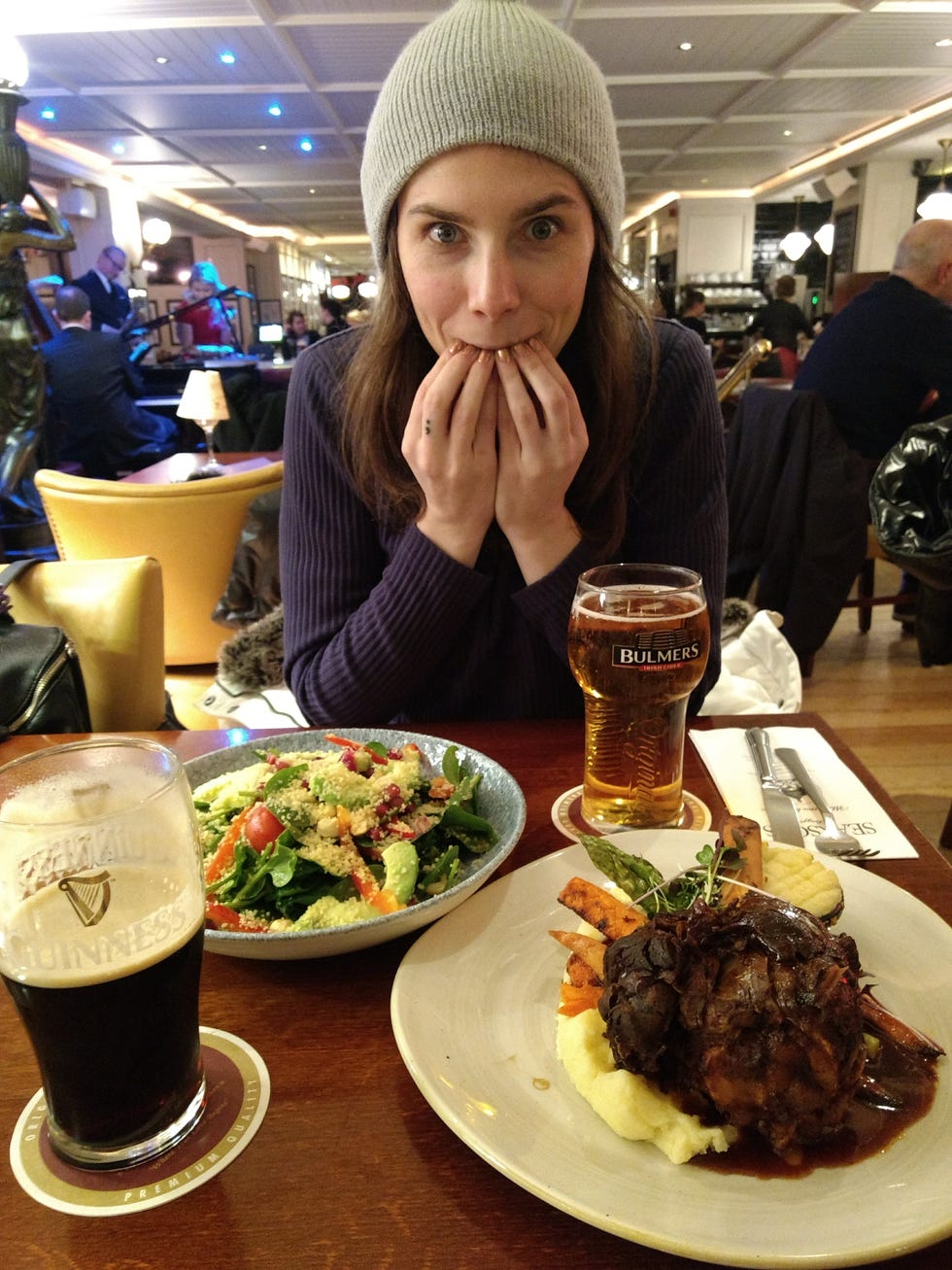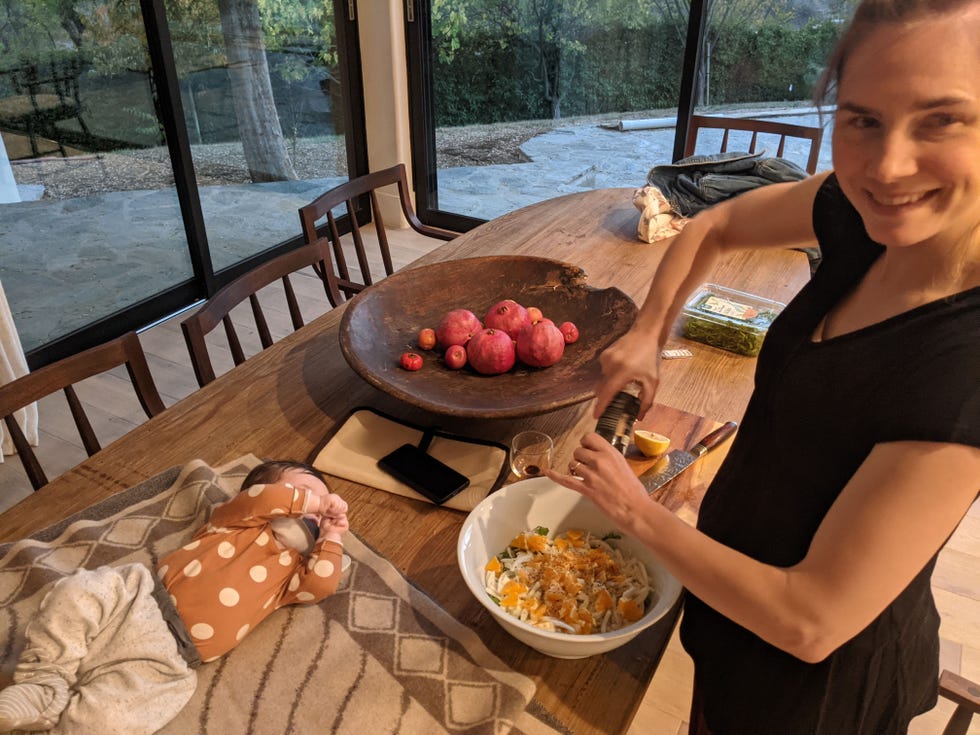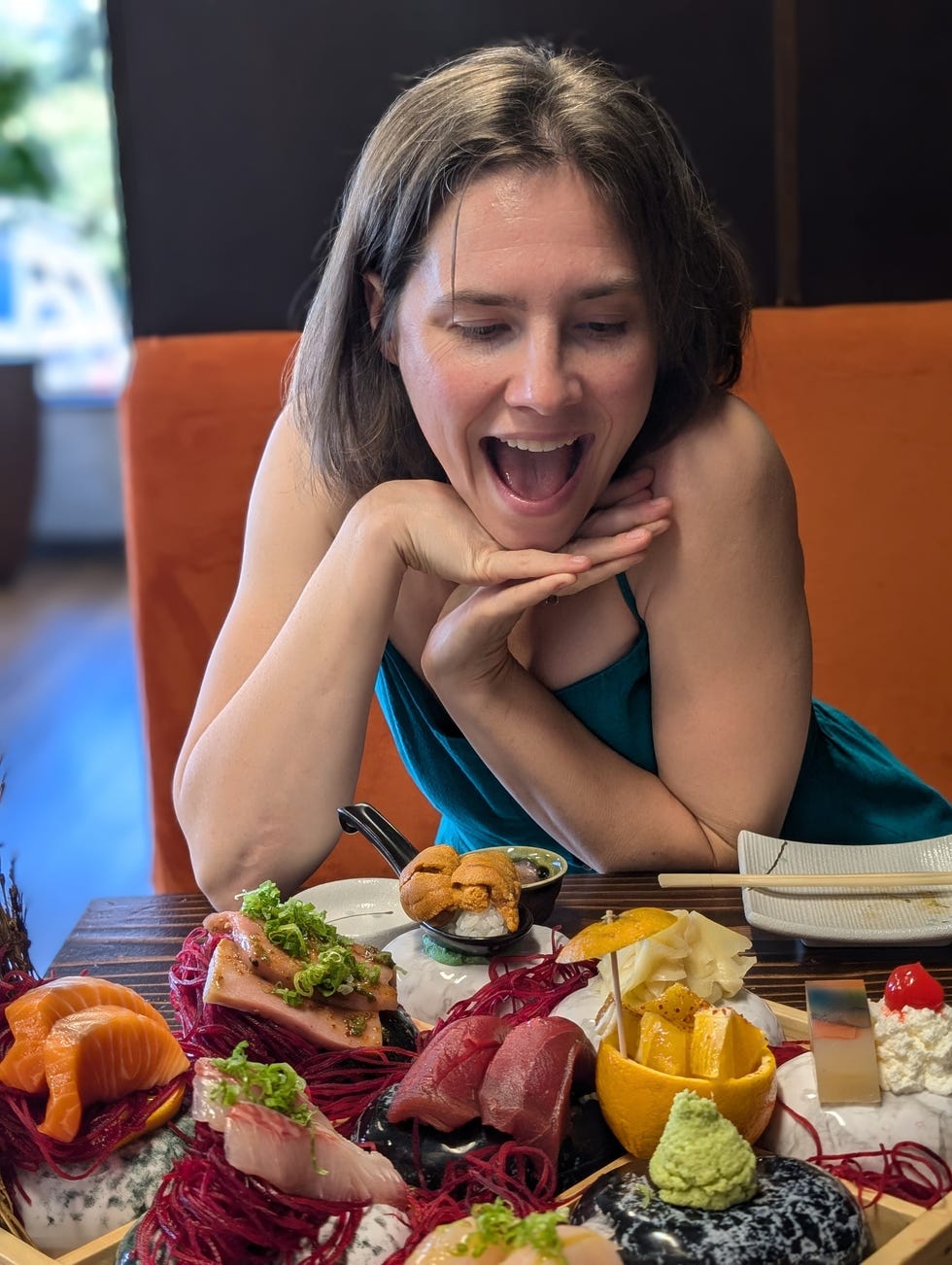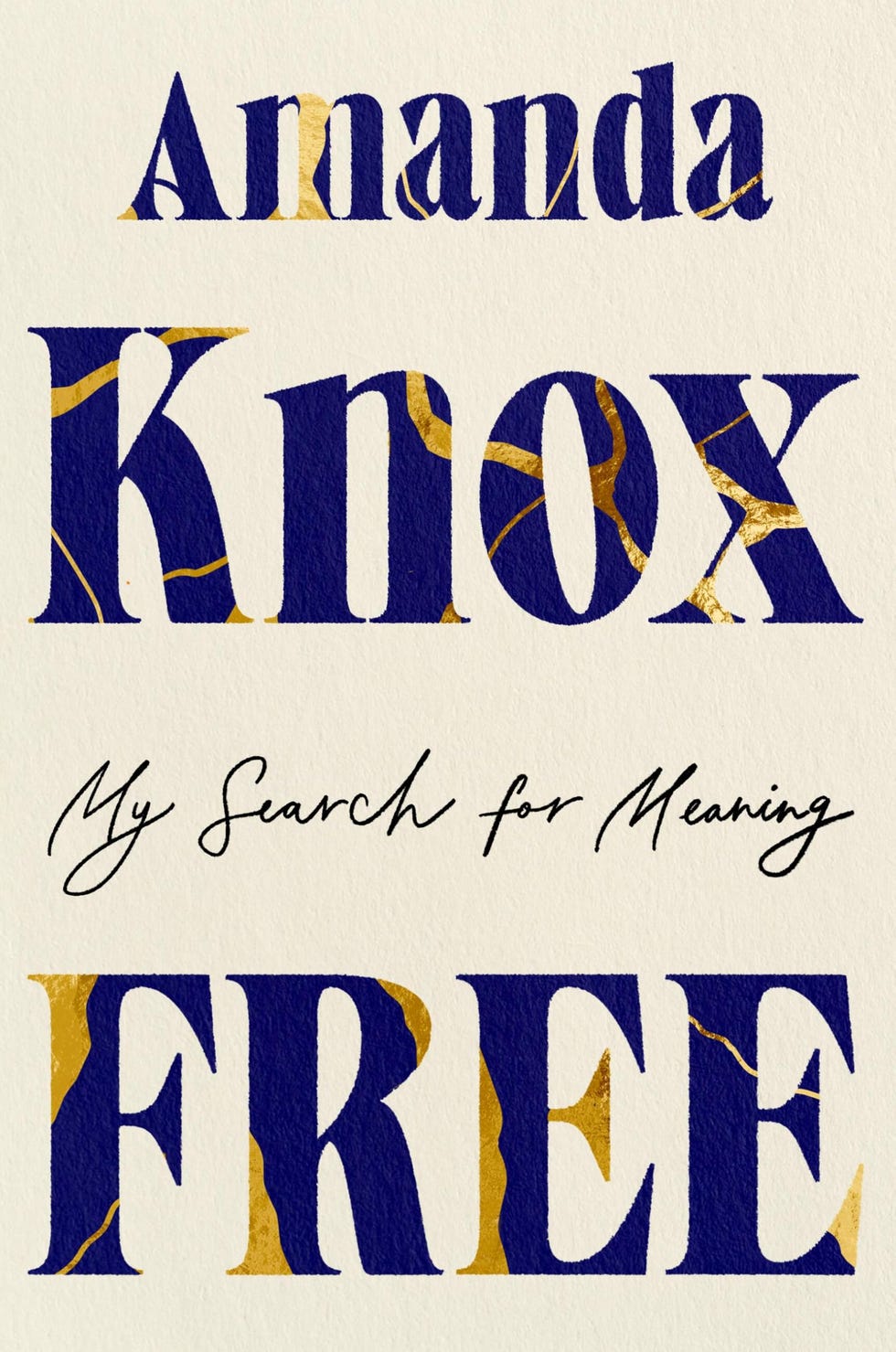Amanda Knox Bonded With Her Cellmates Through Food

Amanda Knox spent nearly four years in an Italian prison for a murder she didn’t commit, becoming a tabloid fixture while fighting for her release. But despite being exonerated, can she ever be free if what she went through continues to define her identity? That’s the question at the center of her new book, Free: My Search for Meaning, out now. In the book—her second memoir—Knox writes poignantly about how she survived prison, her return to “ordinary” life after she got out, and her decade-long journey to truly feel free. In the exclusive excerpt below, Knox writes about how cooking with her cellmates bonded the “throwaways” and gave them purpose in one another.
I like to eat. As a kid, my family called me a bottomless pit. I would stuff myself with as many waffles as I could, order the biggest hamburger on the menu, and unashamedly lick every last bit of sauce off a plate. I had a surprisingly large appetite because I was uncommonly active. I was playing three sports at one time and constantly running around, a 12-year-old with a high-octane metabolism.
But consuming food is not the same thing as making it. At my dad’s house, food mostly came from a box or the freezer. We ate a lot of Hamburger Helper and Costco hot dogs. At my mom’s house, cooking was simple: steam some rice, sauté some chicken, season it all with lemon pepper. I remember Mom becoming so excited when she discovered a recipe for orzo salad with peppers and olives and tomatoes.
But I ate most often at Oma’s house. Oma was always cooking something, and it was usually German food. Once in a while, she tried making spaghetti, but it turned out horribly—mushy noodles, sauce from a can. Germans aren’t exactly known for their pasta.
There was always too much food at Oma’s, so I’d take leftovers to school, and while other kids were eating their ham and cheese sandwiches, I was slurping up lentil stew with ham hock. My classmates thought my food looked gross, but I reveled in eating it in front of them, making a display of how delicious it was. They were missing out on all the savory and pickly goodness of German food.

Knox’s happier times with food in more recent years.
Though I helped Oma make rouladen at Christmas—beef stuffed with pickles and onions and topped with gravy—I didn’t cook all that much as a kid, or even as a young adult. In my first years of college, I lived off takeout Thai food and cheap sushi. I remembered how good authentic Italian food was from a family trip to Rome when I was 14, and as I packed for my semester abroad, salivating over the thought of handmade pizza, I had no idea how much my relationship with food was about to change.
When I arrived in Italy, I did so with an open mouth. I filled it with the ripest tomatoes and the freshest mozzarella. The simple ingredients were so exquisite I didn’t even need to cook. I loved Italy for a lot of reasons, but this was near the top. The Italians are serious about food—about cooking it, about eating it, and about building their social world around it. In the span of five short weeks, my culinary world was transformed. And then it was transformed again.
People often say to me, half in jest, “Hey, at least the prison food must have been better in Italy!” Or if I’m going out to dinner with someone and they choose an Italian restaurant, it’s “Sorry, you’re probably sick of it!” But the thing is, I didn’t eat real Italian food for those four years. I ate prison food. Prison food is prison food, and my prison was no exception.
“My whole life, I’d eaten with gusto and I’d moved with vigor, and that was now gone.”
Each morning we’d receive a hot beverage for breakfast. I usually took the instant coffee, which tasted strangely (but not badly) like toast. For lunch and dinner, you’d hand your metal dish through a slot in the barred door and they’d slop on a starch, a veggie, and some meat. The starch was typically pasta drizzled with olive oil. I rarely ate it. I love vegetables, but what I got in prison was bland and boiled to death. Boiled carrots. Boiled spinach. Boiled potatoes. Starch upon starch. The protein was usually more cartilage than meat, and I could rarely tell what animal it had come from. I never touched it.
My whole life, I’d eaten with gusto and I’d moved with vigor, and that was now gone. Without room to run around, and without anything nourishing or delicious, I became a bit emaciated. My body was a reflection of my mind.

Knox savoring an icecream sundae.
Occasionally, all we’d get were the leftovers from the men’s side of the prison. It was the same food, just cold by the time it arrived. Once, they simply ran out of food, and we got nothing but bread. But we were allowed to buy food from the commissary. Often, when the meals were too disgusting to eat, I’d subsist on a pouch of precooked lentils. We could also do some rudimentary cooking of our own. We could buy basics, like oil and spices.
One day, they served us boiled potatoes for lunch, and my cellmates decided we ought to pool our servings together to make gnocchi. I looked at them blankly. You don’t know how to make gnocchi? I only knew how to microwave a Hot Pocket, but I was eager to learn. Making gnocchi wasn’t that difficult; it just took a little time. We mashed the potatoes up and kneaded them together with egg and a little flour to make the dough, then pressed them in our palms with a thumb. A quick boil, a little olive oil and salt—mwah! They were delicious.
“Breaking bread together was an act of resistance; it was freedom.”
This is how I learned to cook. My cellmates and I took the crummy ingredients the prison provided and used whatever was at our disposal to conjure up something tasty. We could buy flour and yeast, which meant we could make pizza dough. But how do you roll it out? With a broomstick, of course. A pot on top of the camp stove was our makeshift pizza oven. I learned to love ingredients I never would have thought to buy back in Seattle. Raw fennel became one of my favorites—I rejoiced when that was the day’s veggie instead of boiled greens. I learned to make a salad out of the raw fennel with olives and oranges I purchased from the commissary.
But these delicious moments were the exception, not the rule. I longed for actual food, especially sushi. I fantasized about it. But even more than the food, I fantasized about the family meals I was missing, everyone gathered around for company as much as sustenance. I knew that back home, Oma was lighting a candle at the table to represent me whenever the family sat down for dinner.
On good days, I felt a bit like that candle: wavering, fragile, but bright. Prison taught me that I could kindle that warmth even in a cell, that a little effort, a little ingenuity, and some humble ingredients could make a worthy meal, and to always be thankful for it.

Knox making an Italian-esque salad.
There’s a saying in Italian: “tutto fa brodo”—everything makes broth. Broth is made by boiling down the leftovers and scraps of food—vegetable peels, chicken bones, fish skins. The stuff you’d otherwise throw away becomes the foundation of everything you make. Everything has a purpose; everything is important.
Prison was chock-full of throwaways. Sabrina, the 18-year-old thief, who fondly recalled pickpocketing tourists and stealing Vespas just for the sake of an afternoon joy ride. Antonia, the 30-year-old lunatic who drank spoiled milk and muttered under her breath about being God incarnate. Maria, the stay-at-home mother who stashed cocaine for the mafia and spent her days endlessly crocheting. Rosa, the 28-year-old model convicted of murdering her boyfriend, who chain-smoked and read voraciously. Fulvio, the drug-dealing trans man who shamelessly flirted with every pretty girl on the cellblock. What kind of broth did we make?
So often, I felt estranged from the environment around me. I didn’t smoke, I didn’t gossip, I didn’t watch soap operas, I didn’t get into fights. More often than not, I wanted to be left alone. I couldn’t be where I truly belonged, and all too often, I couldn’t relate to the experiences of everyone around me, nor they to mine.

Amanda Knox with sushi, the food she longed for most while she was in prison.
But then Maria showed me how to make gnocchi. Sabrina taught me how to belly dance. Rosa let me borrow her Fabri Fibra CD and helped me translate poetry. Fulvio made me laugh. Antonia . . . well, Antonia was mostly harmless and doing the best she could. For better or worse, I was exposed to the humanity of the women trapped alongside me in prison, women who had committed crimes both petty and grave, women who continued to struggle with mental illness, impulse control, and emotional instability.
They were not my friends, exactly. I guess they were my peers, in that we were all boiling in the same pot together. We all knew what it was like to be cast off, thrown away. We all knew what it was like to live deprived of opportunity and purpose. And every day, as we rubbed shoulders watching our lives slipping away, we each found new opportunities and purposes in one another, in something as small as shaking boiling milk in an empty two-liter water bottle until it turned into foam. Like so many of the makeshift delights of prison, making a cappuccino during siesta was only worth the effort if the whole cell was gathered around the percolator.
Our circumstances isolated us from one another like the dividers on a cafeteria tray, as we slid our plates through the slot in the bars to receive our personal allotment of slop. And we could have coveted those scraps of food like wary animals. But breaking bread together was an act of resistance; it was freedom. It allowed us to conjure a new family, at least for the duration of a meal.
Adapted from FREE: MY SEARCH FOR MEANING by Amanda Knox, published on March 25, 2025. Copyright © 2025 by Amanda Knox. Used by arrangement with Grand Central Publishing, a division of Hachette Book Group. All rights reserved.
elle






